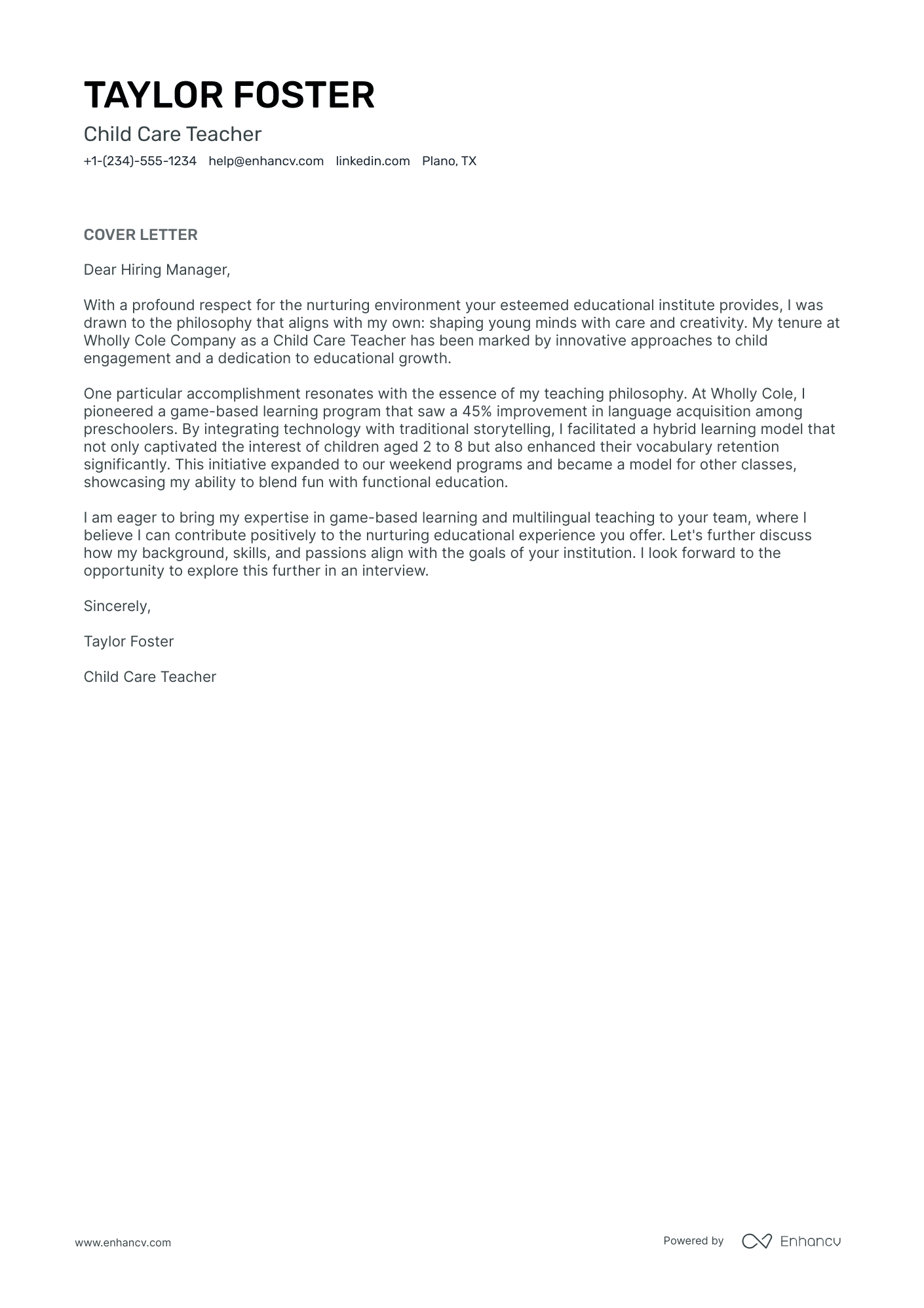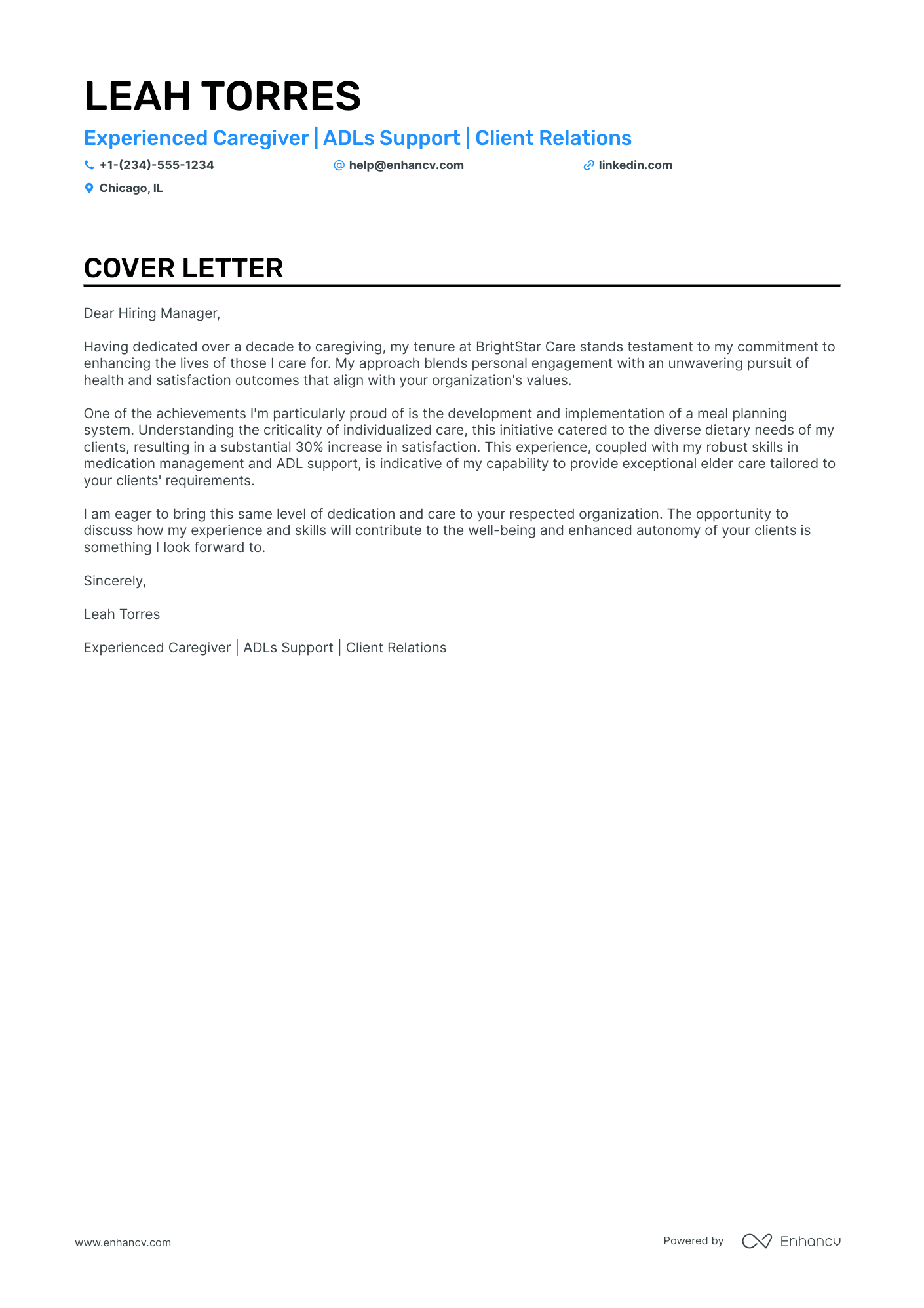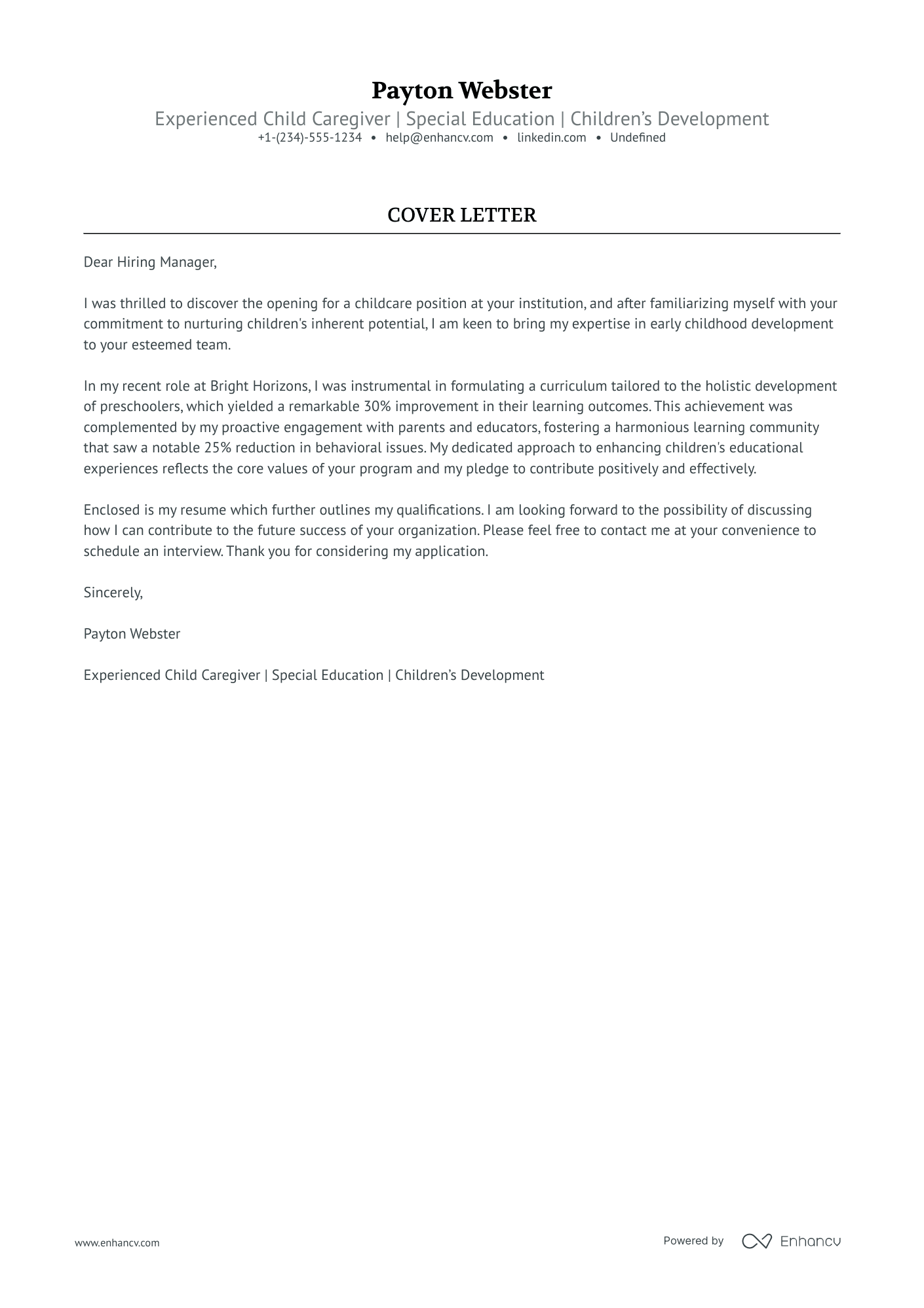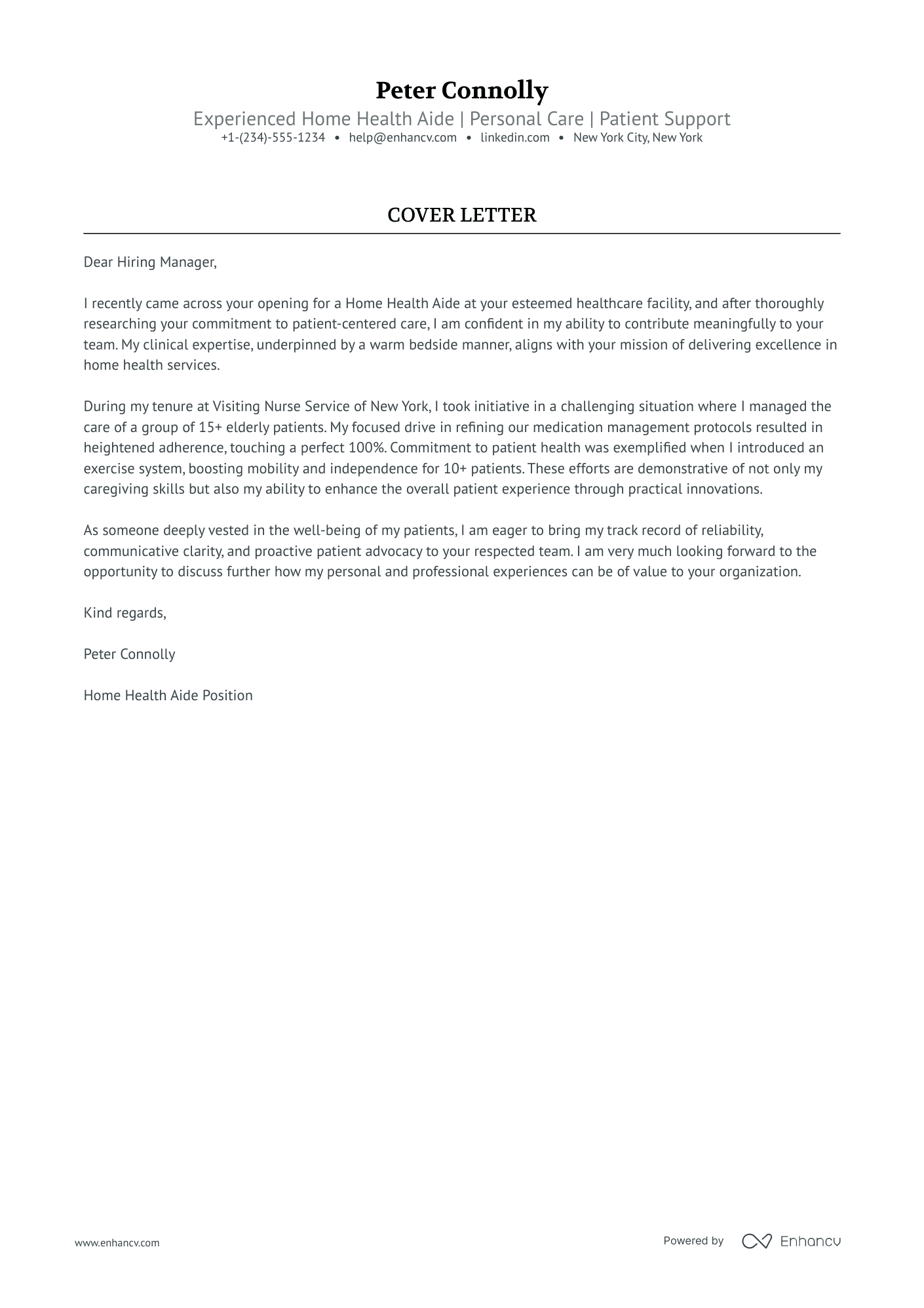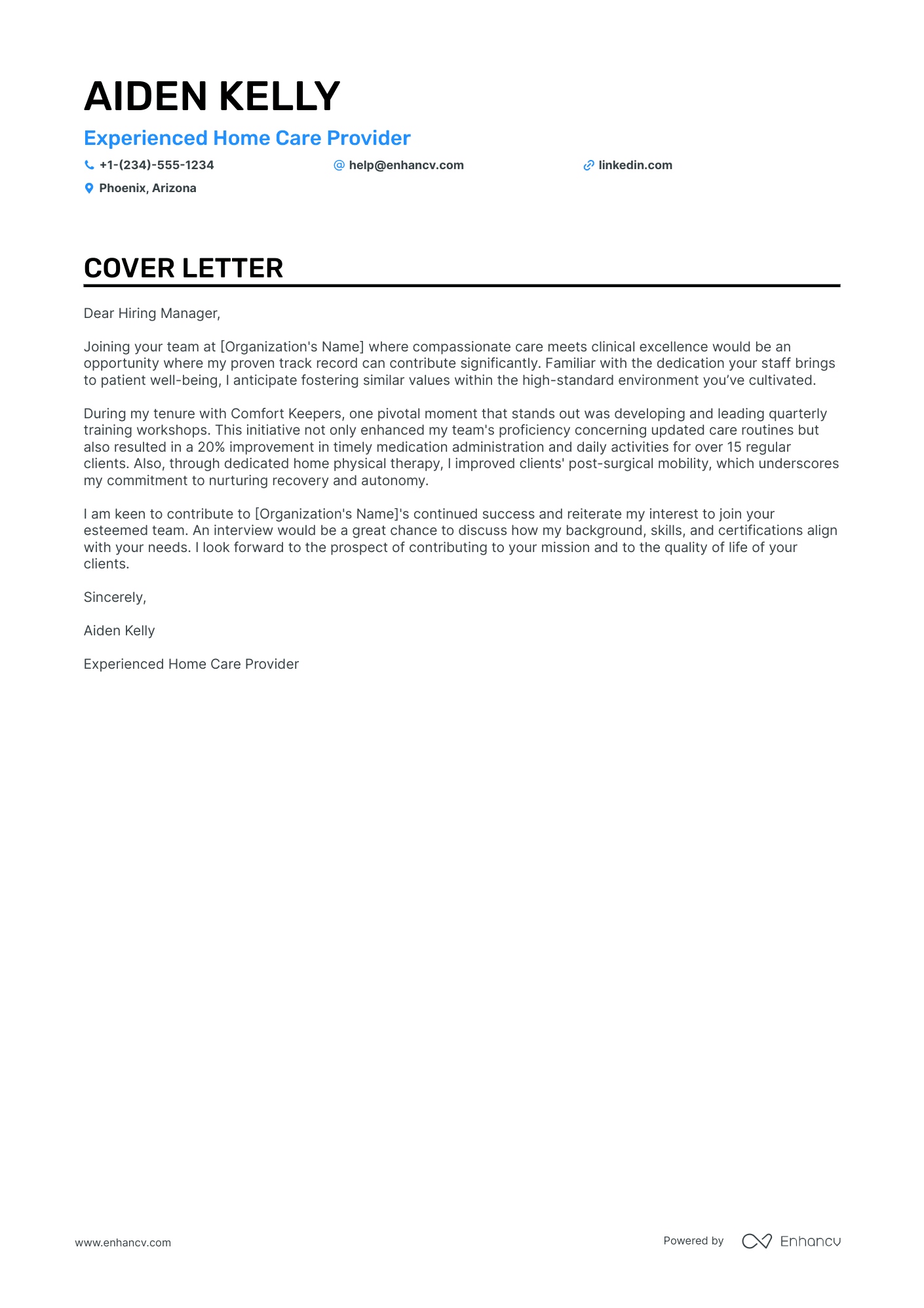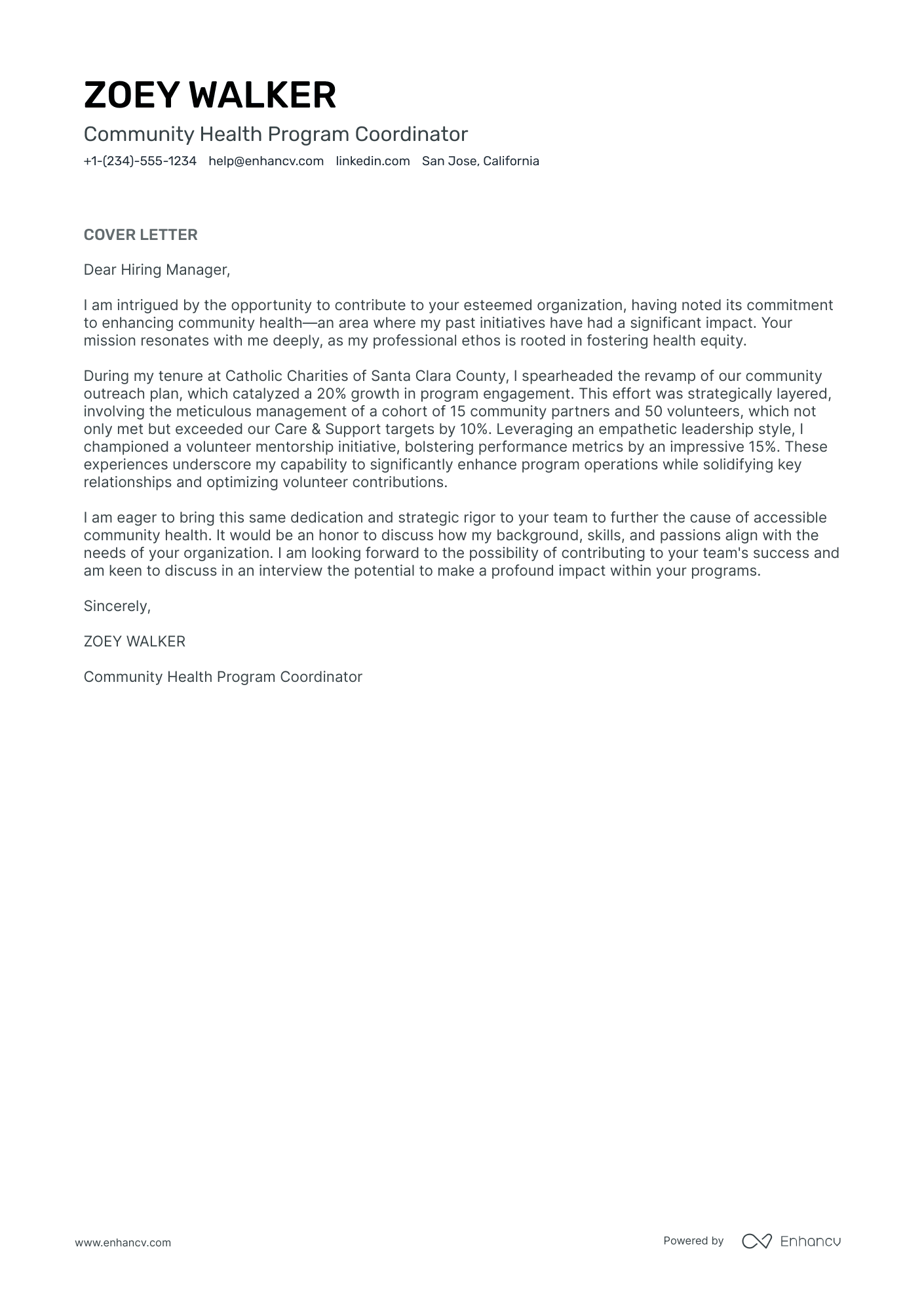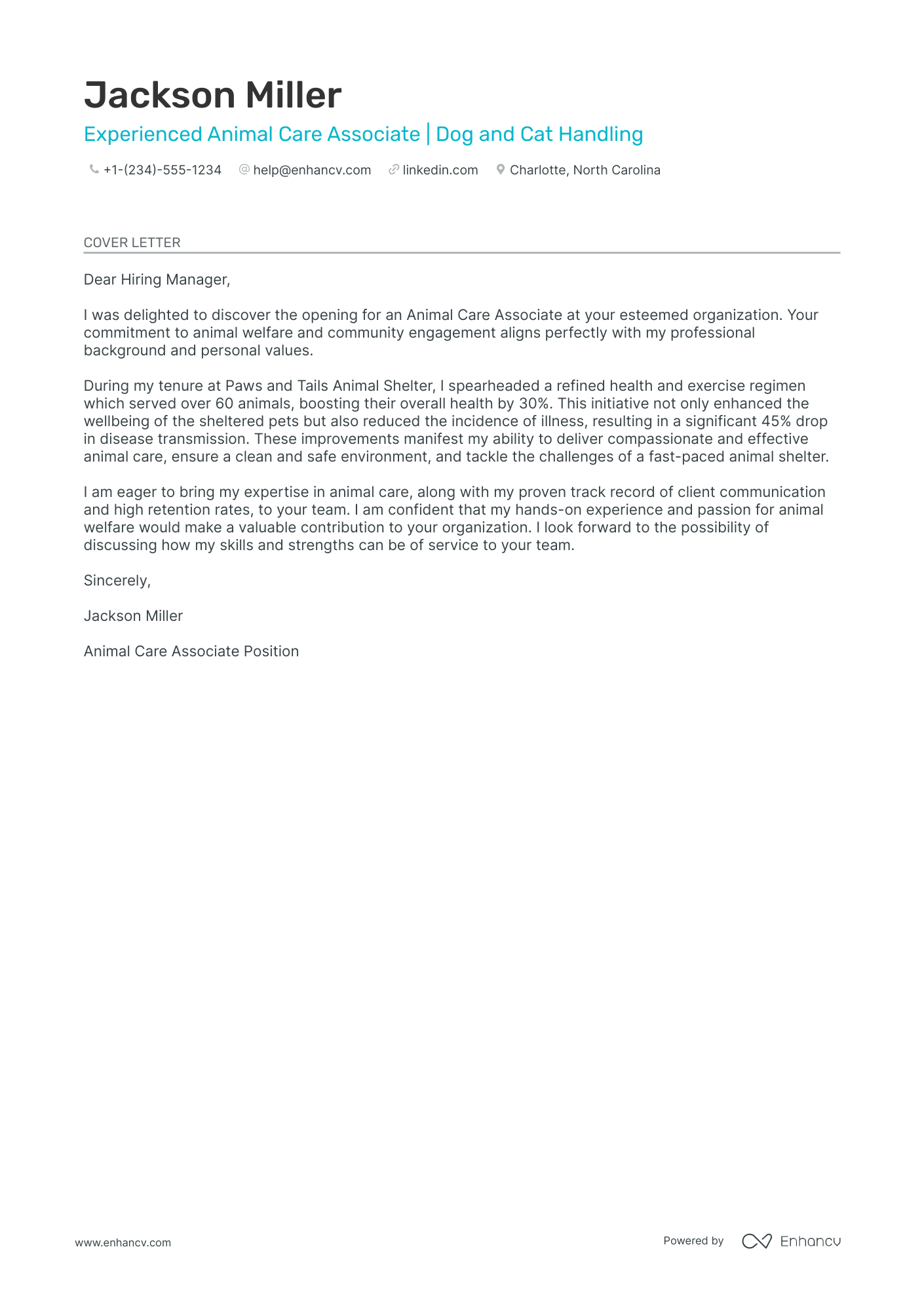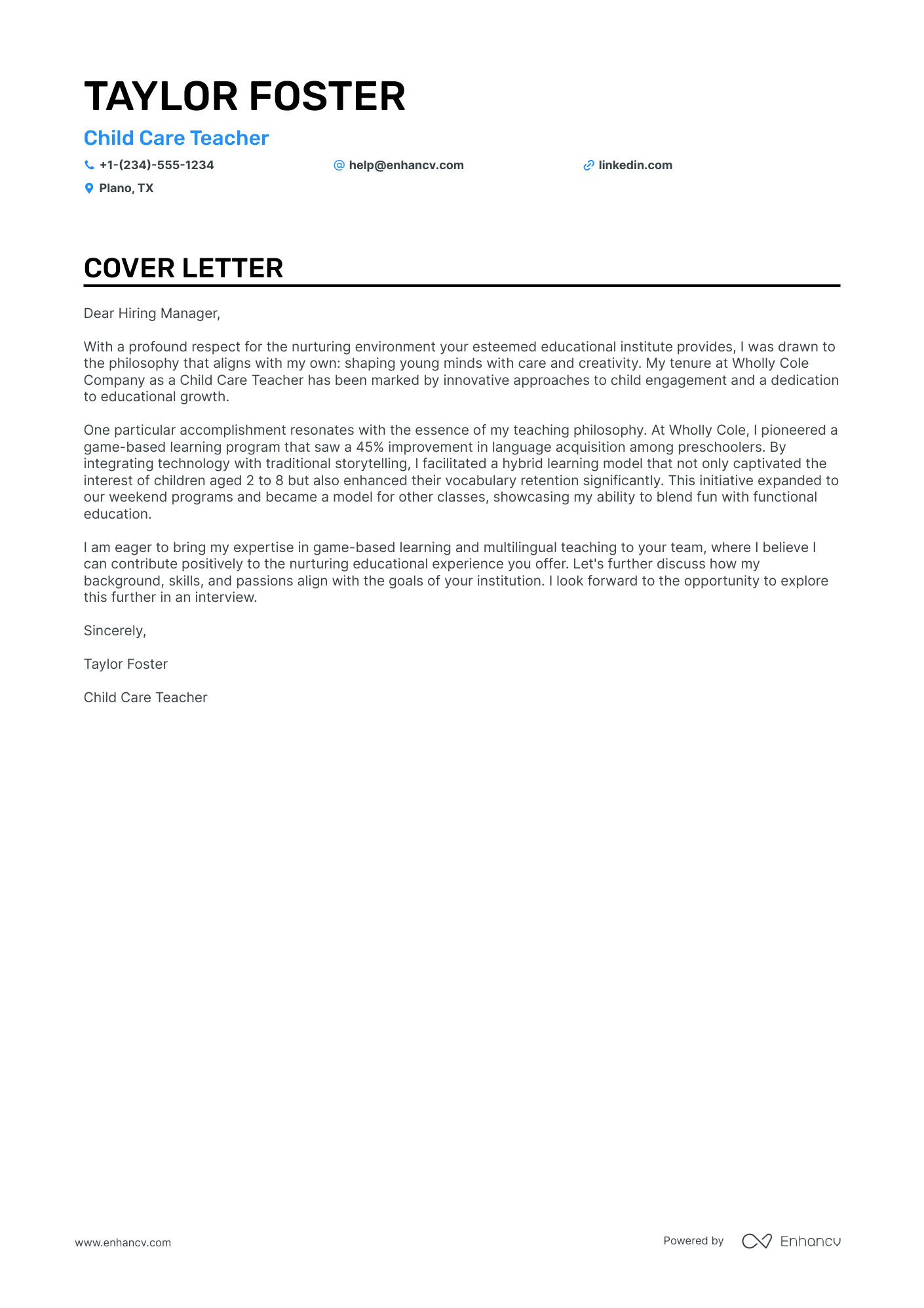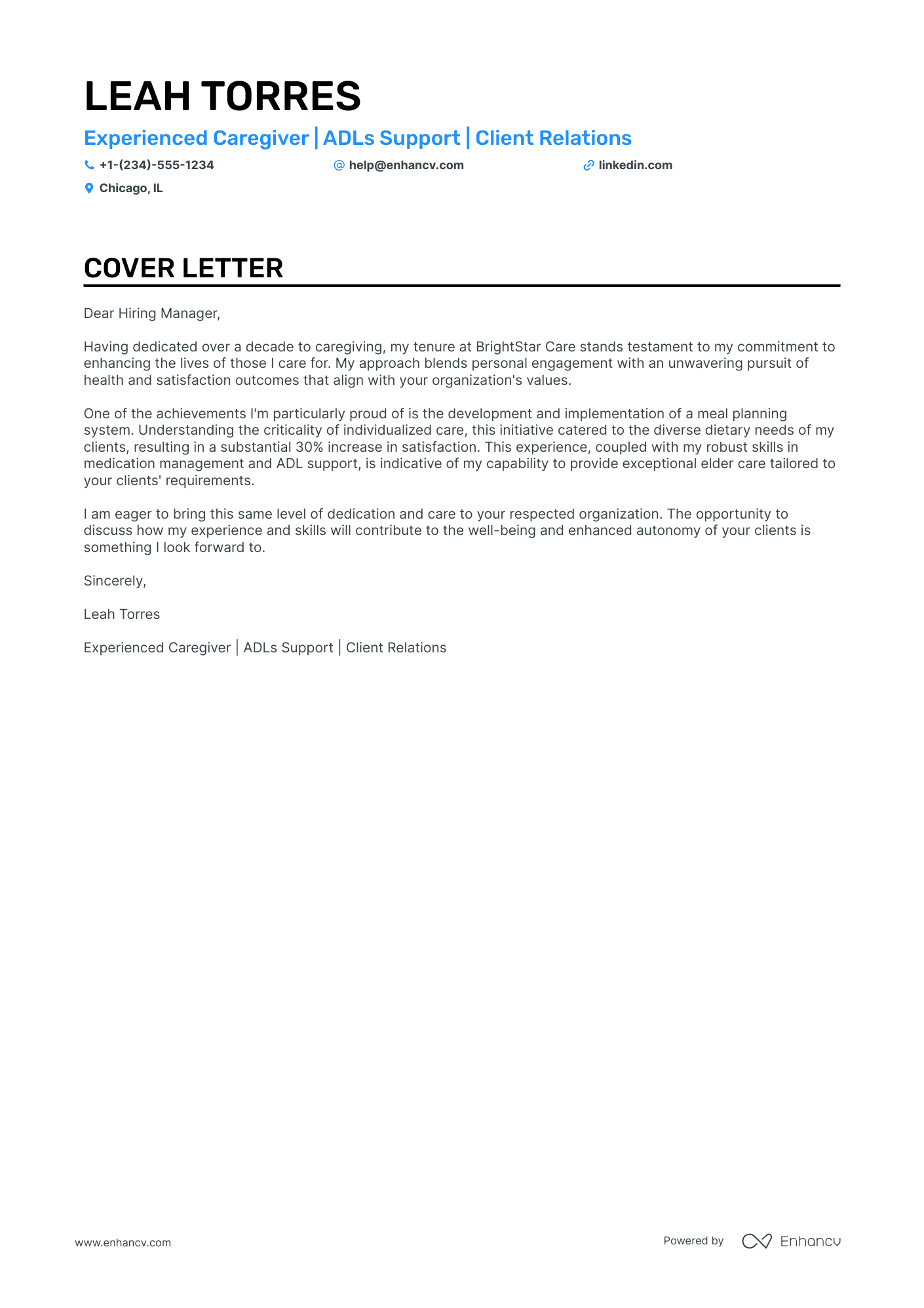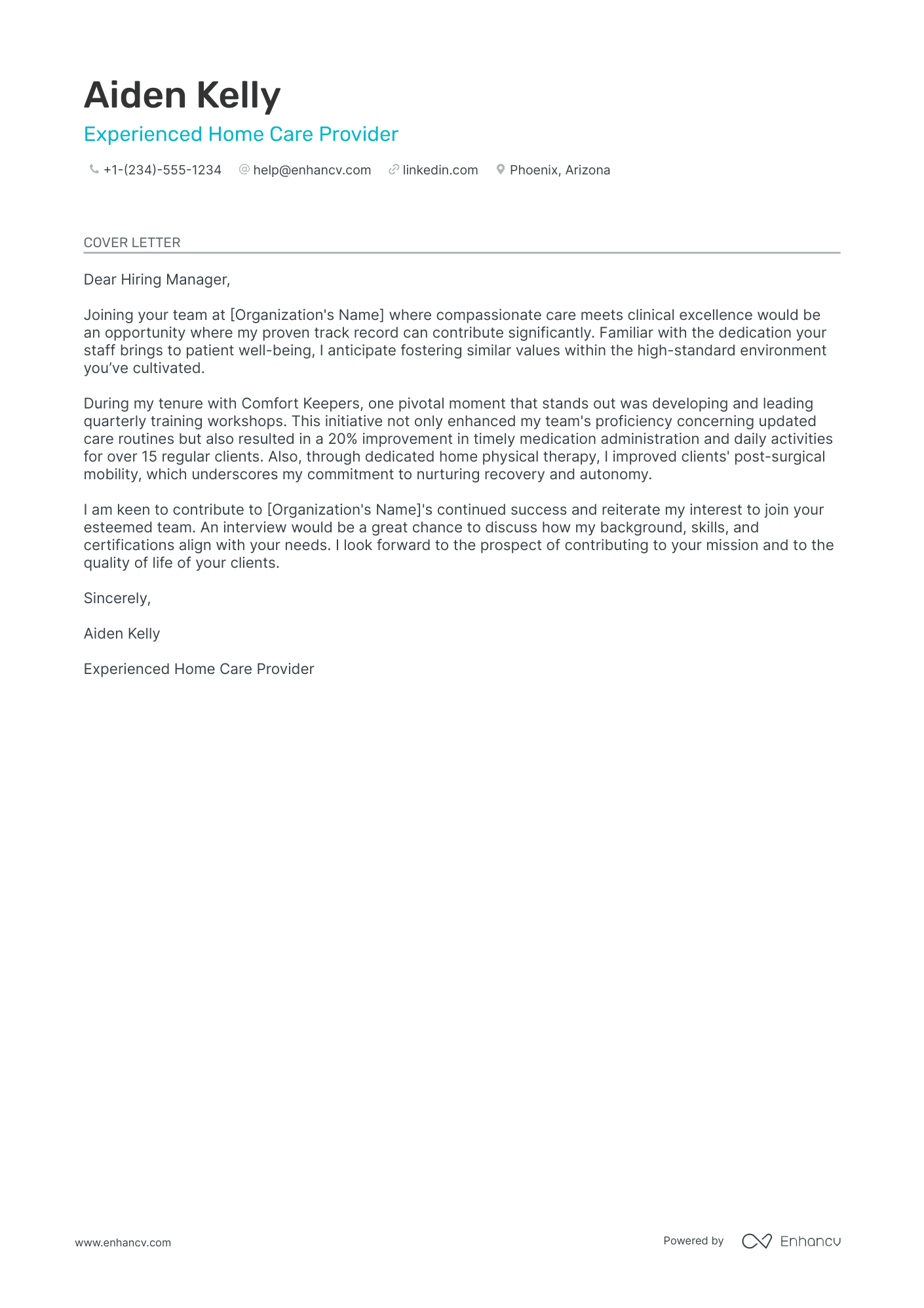Crafting a caregiver cover letter can often seem daunting. You've found the perfect job, but suddenly, you hit a snag: a cover letter is required, and it feels like another hurdle to leap over. This isn't just a repeat of your resume; it’s your chance to share a meaningful achievement that showcases your professional pride. Keeping it to one page, sidestepping clichés, and maintaining formality is the trifecta for success. Let's guide you through writing a cover letter that resonates and tells your story effectively.
- Introduce your profile to catch recruiters' attention;
- Use professional templates and examples to make sure your caregiver cover letter follows the best industry standards;
- Settle on your most story-worthy achievement to shine a light on what makes your application unique;
- Write a caregiver cover letter, even when you lack professional experience.
Ready to start with the basics: upload your resume to Enhancv's AI, below, to see the caregiver cover letter it would write for you.
If the caregiver isn't exactly the one you're looking for we have a plethora of cover letter examples for jobs like this one:
Drop your resume here or choose a file.
PDF & DOCX only. Max 2MB file size.
Caregiver cover letter example
Payton Webster
Dallas, TX
+1-(234)-555-1234
help@enhancv.com
- Highlighting relevant direct experience (such as leading the development and implementation of individualized care plans) showcases a history of actionable and successful initiatives.
- Emphasizing specific improvements achieved (like the 25% improvement in client mood and cognitive abilities) provides measurable outcomes that demonstrate the candidate's impact and effectiveness.
- Detailing specialized education (credentials in Nursing and Gerontology) aligns the candidate's academic background with the requirements and expectations of the role in the elderly care sector.
- Mentioning soft skills (such as medication management, patient care, and emotional support) paints a well-rounded picture of the candidate's competencies, crucial for a caregiver position that demands both professional and personal aptitude.
The format of your caregiver cover letter: structure, fonts, margins, and more
Your caregiver cover letter should include a header (with your name, position, and date); a greeting and introductory paragraph; a body and closing paragraphs; and an optional signature.
Remember that you're writing your caregiver cover letter for recruiters - as the Applicant Tracker System won't scan this content.
Here are a few more tips and tricks to keep in mind when formatting your caregiver cover letter:
- Use the same font in your caregiver cover letter and resume. We recommend modern fonts, e.g. Lato and Rubik, to help you stand out, instead of the stereotypical Arial and Times New Roman.
- Each paragraph should have single spacing, which is already set up for you in our cover letter templates.
- Our cover letter builder follows industry standards for your caregiver cover letter formatting - with a one-inch margin, surrounding your content.
- Always export your caregiver cover letter in PDF to ensure the image or text quality stays the same and your writing isn't moved about.
Too busy to write your cover letter? Let our free cover letter generator handle it in just a few clicks.
The top sections on a caregiver cover letter
- Header with Contact Information: Include your name, address, phone number, and email so the employer can easily contact you; it also makes your cover letter appear professional and organized.
- Greeting or Salutation: Address the recruiter or employer by name if possible, as it shows you have done your research and are genuinely interested in the position.
- Introduction: Clearly state the caregiving position you are applying for and briefly mention how your skills and experience make you a suitable candidate, as this sets the tone and directly links your qualifications to the job.
- Body with Relevant Experience and Skills: Highlight your caregiving experiences, specific skills, and personal attributes that pertain to providing compassionate and effective care, as this is where you make your case for why you should be considered for the job.
- Closing and Call to Action: Reiterate your interest in the position, thank the reader for considering your application, and include a proactive statement about hoping to discuss your qualifications further in an interview, giving your cover letter a strong and assertive finish.
Key qualities recruiters search for in a candidate’s cover letter
- Strong empathy and compassion: Critical for establishing trust and fostering emotional support to the care recipient.
- Experience with specific care requirements: Demonstrates understanding of the unique needs of individuals with disabilities, illnesses, or the elderly.
- Patience and resilience: Essential for managing challenging behaviors and the physical demands of caregiving tasks.
- Reliability and trustworthiness: Assurance to the families that their loved ones are in dependable hands.
- Excellent communication skills: Necessary for effectively interacting with care recipients, families, and medical professionals.
- Certified training in CPR and first-aid: Shows preparedness for emergency situations, a vital skill for caregivers.
Greeting recruiters with your caregiver cover letter salutation
What better way to start your conversation with the hiring manager, than by greeting them?
Take the time to find out who the professional, recruiting for the role, is.
Search on LinkedIn, the company website. And for those still keen on making a fantastic first impression, you could even contact the organization, asking for the recruiter's name and more details about the job.
Address recruiters in the caregiver greeting by either their first name or last name. (e.g. "Dear Anthony" or "Dear Ms. Smarts").
If you're unable to discover the recruiter's name - don't go for the impersonal "To whom it may concern", but instead use "Dear HR team".
List of salutations you can use
- Dear Hiring Manager,
- Dear [Name of the Hiring Manager],
- Dear [Name of the Department] Team,
- Dear [Name of the Company] Hiring Committee,
- Dear [Job Title] Search Committee,
- Dear [Full Name of the Hiring Manager],
First introductions in your caregiver cover letter
Within your caregiver cover letter introduction, genuinely state what you like about the organization.
Research the latest company projects, honorary awards, company updates, etc.
Write up to two sentences to let recruiters know what impresses you about the company,
This would help you to set a good tone for the rest of the communication.
Choosing your best achievement for the middle or body of your caregiver cover letter
Now that you have the recruiters' attention, it's time to write the chunkiest bit of your caregiver cover letter.
The body consists of three to six paragraphs that focus on one of your achievements.
Use your past success to tell a story of how you obtained your most job-crucial skills and know-how (make sure to back these up with tangible metrics).
Another excellent idea for your caregiver cover letter's middle paragraphs is to shine a light on your unique professional value.
Write consistently and make sure to present information that is relevant to the role.
A sincere and original way to end your caregiver cover letter
When writing their caregiver cover letter, candidates tend to use one of these phrases, "Sincerely yours" or "I look forward to hearing from you".
Both statements show good manners, but your cover letter should end in a more actionable manner.
Write about:
- how you see yourself growing in the role/organization;
- the benefits you would bring about (you'd impress even more with tangible metrics);
- the next steps in the process (provide your availability for interviews).
What to write on your caregiver cover letter, when you have zero experience
The best advice for candidates, writing their caregiver cover letters with no experience, is this - be honest.
If you have no past professional roles in your portfolio, focus recruiters' attention on your strengths - like your unique, transferrable skill set (gained as a result of your whole life), backed up by one key achievement.
Or, maybe you dream big and have huge motivation to join the company. Use your caregiver cover letter to describe your career ambition - that one that keeps you up at night, dreaming about your future.
Finally, always ensure you've answered why employers should hire precisely you and how your skills would benefit their organization.
Key takeaways
Within this Enhancv guide, we've provided you with plenty of advice and inspiration on writing your caregiver cover letter:
- Always make sure your caregiver cover letter is tailored to the role you're applying for to make a good impression on recruiters;
- In your caregiver cover letter include a header (with your name, the role you're applying for, date, and contact details) and an introduction of up to two sentences that highlight your key accomplishment or why you'd fit the role;
- Focus your caregiver cover letter body on one sole achievement through your career and all the valuable lessons, skills, and know-how you've learned (that are relevant to the role);
- Ensure your caregiver cover letter closing statement isn't generic and includes either a call to action or a promise;
- If you lack professional experience, shift recruiters' focus to a relevant achievement (thanks to your academic or versatile experience) or toward your dreams and goals for professional growth.
Caregiver cover letter examples
By Role
